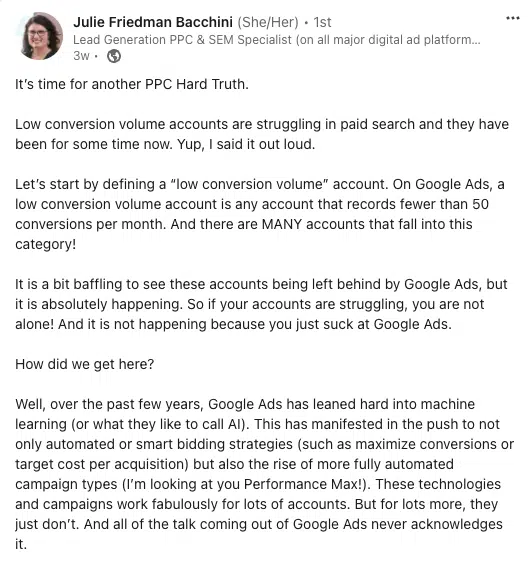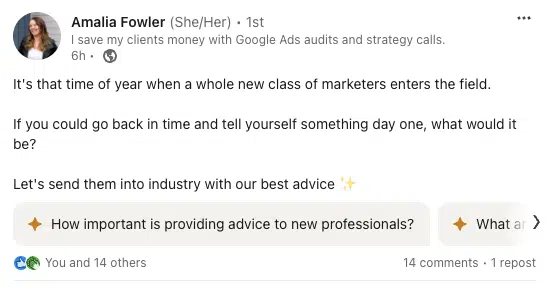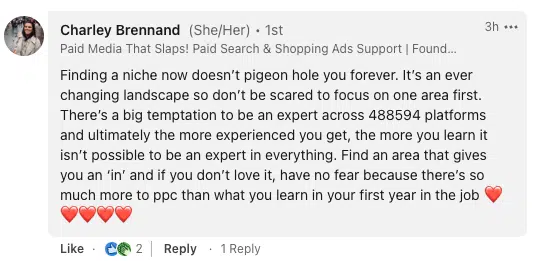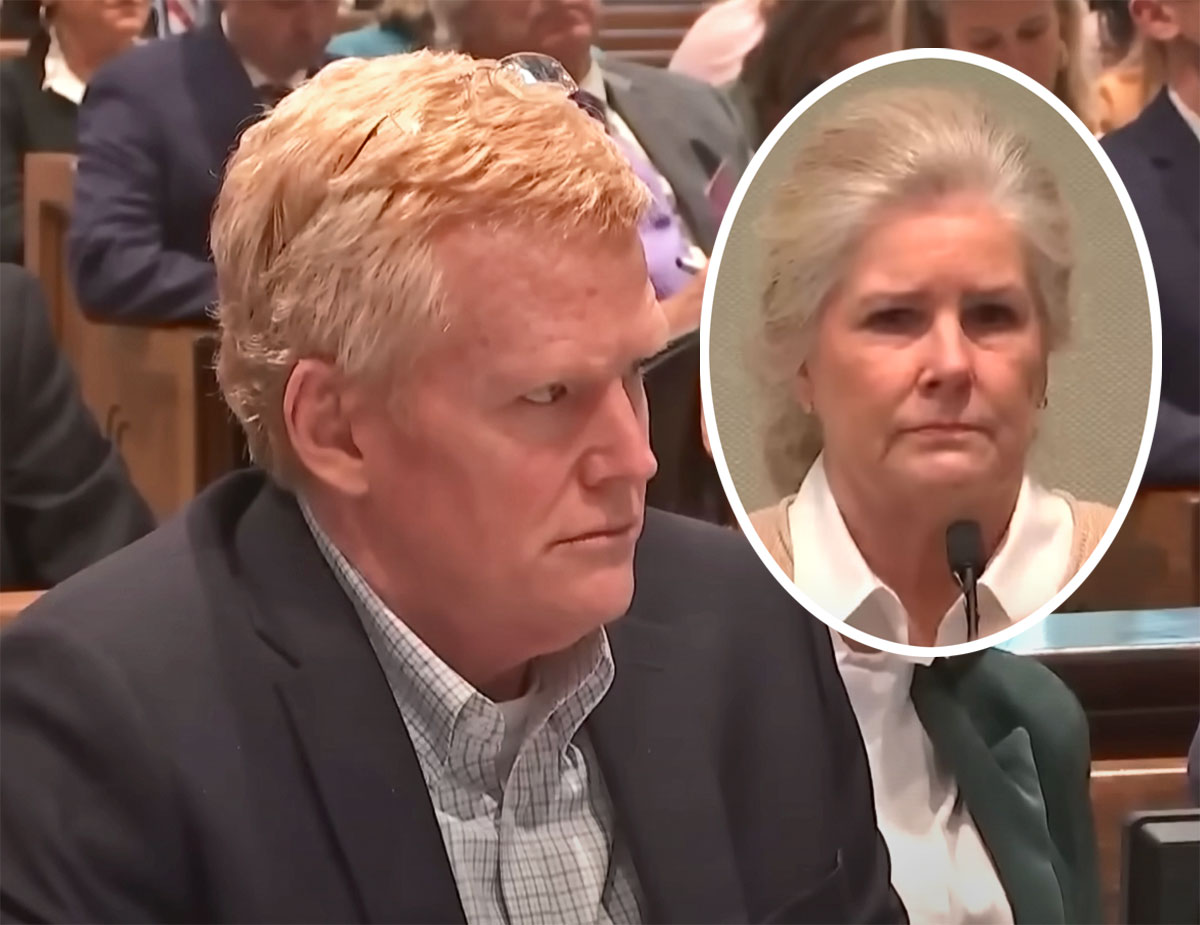#Why paid search marketers need a growth mindset

Table of Contents
Learn why adaptability and continuous learning are key to success in your PPC career and how to cultivate a growth mindset.
With constant updates and the push to accept AI and automation, it can be easy to feel overwhelmed and discouraged as a paid search marketer. But you aren’t alone.
In a dynamic field like paid search, success lies not in clinging to what worked yesterday but in adopting a growth mindset.
Thriving in PPC isn’t about what you know now; it’s about your willingness to learn.
This article explores the concept of a growth mindset and highlights conversations within the paid search community that exemplify this mindset.
What is a growth mindset?
It’s the belief that your abilities and knowledge aren’t set in stone.
Through hard work, learning and openness to feedback, you can continuously improve and achieve your goals.
Imagine perceiving challenges as opportunities for learning and growth rather than as obstacles. That’s the power of a growth mindset!
A contrast to a growth mindset would be a fixed mindset.
With a fixed mindset, people believe their talents and intelligence are fixed.
If you’re “not good at math,” you’ll never be good at data analysis (a crucial skill in PPC).
This example of a fixed view can hinder your progress and leave you feeling discouraged when faced with setbacks while working on accounts.
A frequent misconception is that you lack the skills to explain or create presentations effectively on campaign strategy. This skill can be learned and developed through practice.
Why a growth mindset matters for PPC marketers
Whether you’re a seasoned expert or thinking of a career in PPC, understanding the key qualities of successful and happy paid search professionals can be helpful.
We often hear about the technical skills and campaign optimization tricks, but let’s be real: happiness is pretty darn important, too.
A growth mindset will not only help you succeed in your career but also contribute to a more enjoyable work life.
Imagine spending all day looking at data, writing ad copy and trying to stay current in PPC while feeling unhappy. If you aren’t feeling fulfilled and enjoying the work, you can feel seriously unmotivated.
Dig deeper: Becoming a world-class PPC ad buyer: 8 key lessons
What a growth mindset may look like in action
Paid search experts with a growth mindset believe their skills and knowledge are constantly evolving. This translates to:
- Continuously analyzing data to understand new audience needs and search trends.
- Testing a new campaign type that the industry has yet to adopt.
- Actively participating in industry discussions and posing insightful questions, even if they feel uncomfortable.
Questions often emerge within the community, and it is through these discussions that we gain deeper insights, uncover hidden opportunities and enhance our understanding of the platforms.
Perhaps you might be interested in pitching and speaking at a paid search conference. While you might feel nervous or unprepared, a growth mindset reminds you that you can successfully present to your peers with practice and preparation.
A fixed mindset may hold you back from taking on new challenges and pushing the boundaries of your knowledge.
It’s easy to get comfortable in our routines and stick to what we know works. However, this limits our potential for growth.
Advertisers need professionals to be growth-minded as well.
Brands don’t want the same old tricks year after year. A growth-minded expert will test new strategies, discover fresh ways to engage audiences and remain receptive to emerging market insights.
Human expertise and machine power mean the future of paid search is here.
Consider, for instance, automated bidding or recent advancements in AI.
Some may see these changes as a loss of control, but a growth mindset frames them as opportunities to enhance account performance and dedicate more time to improving landing pages and customer experience.
This willingness to learn, experiment and adapt keeps paid search experts at the forefront.
Dig deeper: How to advance your SEM career: 9 attributes to master
Collective paid search conversations: Exploring how the paid search community fosters learning and adaptability
Let’s look at the conversations happening on LinkedIn within the paid search community. Here is part of Julie Bacchini’s viral LinkedIn post with 225 reactions:


In the post, Friedman Bacchini acknowledges the limitations of data and the value of alternative approaches, both hallmarks of a growth mindset.
Sharing a hard truth, even if uncomfortable, can expose areas for improvement, leading to better outcomes in the long run. Conversations like this spark productive conversations and promote accountability in the community.
Her post does a great job of differentiating between a hard truth and negativity. A growth mindset approach involves delivering the truth in a constructive and respectful way, which she does very well here.
Another example comes from Jordan Brunelle. In his post, Brunelle highlights the importance of understanding the audience.


He also points out that different clients need different strategies.
Both points demonstrate that he is a growth mindset professional, adapting his approach accordingly.
A last point highlights that continuous learning ensures they can cater to “super niche” audiences and identify hidden problems customers might not even know they have.
The paid search community also gives collective advice for new marketers entering the field.
Amalia Fowler recently shared a LinkedIn post celebrating graduation season, encouraging fellow professionals to share their advice for aspiring marketers.


In her advice, Charley Brennand advocates for focused learning and adaptability. One key piece of her guidance is concentrating on a niche. This aligns with a growth mindset by promoting deep learning rather than attempting to be a jack-of-all-trades.


Jyll Saskin Gales has built her entire business model around growth. As an early pioneer among Google Ads coaches, she stands out in the industry.
She frequently shares on LinkedIn how she meticulously studies Google documentation to deepen her understanding of the platform.


In addition to actively seeking out new information, she is willing to find weaknesses and areas for opportunity, even in established resources like the Google Ads Help Center.
Cultivate a love for learning and experimentation
The paid search industry thrives on a collaborative spirit, where we learn from each other’s triumphs and challenges to stay ahead of the curve.
The industry is dynamic, and the experts who succeed embrace the power of a growth mindset.
So, ditch the fixed mindset and cultivate a love for learning and experimentation.
In the long run, you’ll find PPC more enjoyable if you have a passion for growth and learning.
No matter how much you’ve learned, there’s always more to discover and improve upon in the constantly evolving world of paid search.
So keep an open mind, be willing to take risks and try new things and remember that your abilities are not fixed – they can always be improved with effort and determination.
Dig deeper: Broad vs. deep expertise: How to decide which is right for you
If you liked the article, do not forget to share it with your friends. Follow us on Google News too, click on the star and choose us from your favorites.
If you want to read more like this article, you can visit our Technology category.



